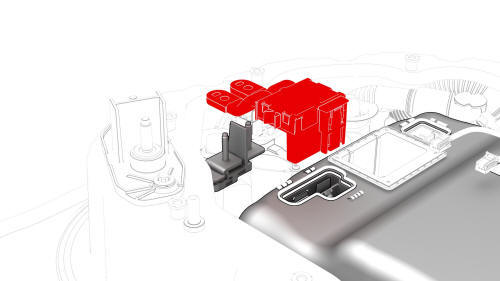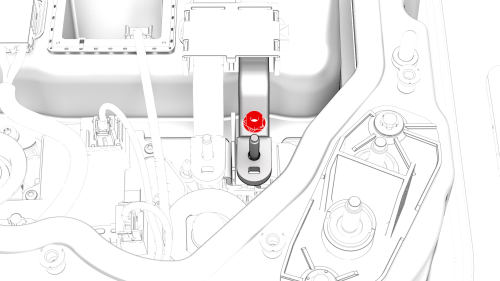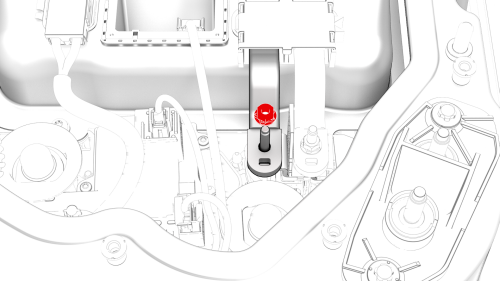Tesla Model 3: Passthrough - DCDC - 12V- Install
Tesla Model 3 2017-2025 Service Manual / Battery System / HV Battery Electrical Components / Passthrough - DCDC - 12V (Remove and Replace) / Passthrough - DCDC - 12V- Install
Install
- Use an IPA wipe to clean the mating surfaces of the DCDC passthrough, and the DCDC harness.

- Install the 12V DCDC passthrough into the penthouse, install the bolts
that attach the 12V DCDC passthrough to the penthouse, and then mark the
bolts with a paint pen after they are torqued.
 Torque 10 Nm
Torque 10 Nm

- Install the bolt that attaches the DCDC ground busbar to the body, and
then mark the bolt with a paint pen after it is torqued.
 Torque 20 Nm
Torque 20 Nm

- Install the DCDC ground busbar to the DCDC passthrough, install a new
nut to attach the DCDC ground busbar to the DCDC passthrough, and then mark
the nut with a paint pen after it is torqued.
.png) Torque 15 Nm
Torque 15 Nm

- Connect the DCDC harness to the power conversion system, and then fasten the clip that attaches the DCDC harness to the power conversion system.

Install the nut that attaches the negative terminal of the DCDC harness to
the negative DCDC passthrough busbar, and then mark the nut with a paint pen
after it is torqued.
.jpg) Torque 4.5 Nm
Torque 4.5 Nm

- Install the nut that attaches the positive terminal of the DCDC harness
to the positive DCDC passthrough busbar, and then mark the nut with a paint
pen after it is torqued.
.jpg) Torque 4.5 Nm
Torque 4.5 Nm
.jpg) Generic Measurement - Actual busbars and fasteners might appear
different
Generic Measurement - Actual busbars and fasteners might appear
different
- Use the Hioki resistance meter to measure the resistance between the positive joint of the DCDC harness and the positive terminal of the 12V DCDC passthrough.
Note: The maximum acceptable resistance is 0.100 mΩ (100 μΩ). If the resistance is above this value, escalate a Toolbox session, as appropriate.
.jpg) Generic Measurement - Actual busbars and fasteners might appear
different
Generic Measurement - Actual busbars and fasteners might appear
different
- Use the Hioki resistance meter to measure the resistance between the negative joint of the DCDC harness and the negative terminal of the 12V DCDC passthrough.
Note: The maximum acceptable resistance is 0.100 mΩ (100 μΩ). If the resistance is above this value, escalate a Toolbox session, as appropriate.
- Install the high voltage controller. See Controller - High Voltage (Remove and Replace).
- Install the pyrotechnic battery disconnect into the penthouse. See Pyrotechnic Battery Disconnect (Remove and Replace).
READ NEXT:
 Power Conversion System- Remove
Power Conversion System- Remove
SPECIAL TOOLS
Connector Removal, Coolant, PCS, M3 (1111868-00-B)
Kit, Svc Plug, Cooling Hose, Model 3 (1135762-00-A)
Tool, Vacuum Cup, 3" x 6" (Qty 2) (1114917-00-A)
Resistance meter, microohm, Hiok
 Power Conversion System- Install
Power Conversion System- Install
Install
Consider your first step.
If the removed power conversion system is to be reinstalled, go to step
5.
If a replacement power conversion system is to be installed, continue to the
n
SEE MORE:
 SD Card - Car Computer (Remove and Replace)
SD Card - Car Computer (Remove and Replace)
Remove
Remove the 2nd row lower seat cushion. See Seat Cushion - Lower - 2nd
Row (Remove and Replace).
Remove the rear underhood apron. See Underhood Apron - Rear (Remove and
Replace).
Remove the cabin intake duct. See Duct - Cabin Intake (Remove and
Replace)
Disconnect 12V power. See 12V
 Superbottle (Dual Motor) - Install
Superbottle (Dual Motor) - Install
Install
Connect the front drive unit heat exchanger-superbottle hose to the
superbottle, and then install the clip.
Install the clip that attaches the front drive unit heat exchanger-superbottle
hose to the superbottle.
Position the superbottle in the vehicle.
Connect the elec
© 2019-2025 Copyright www.tmodel3.com

